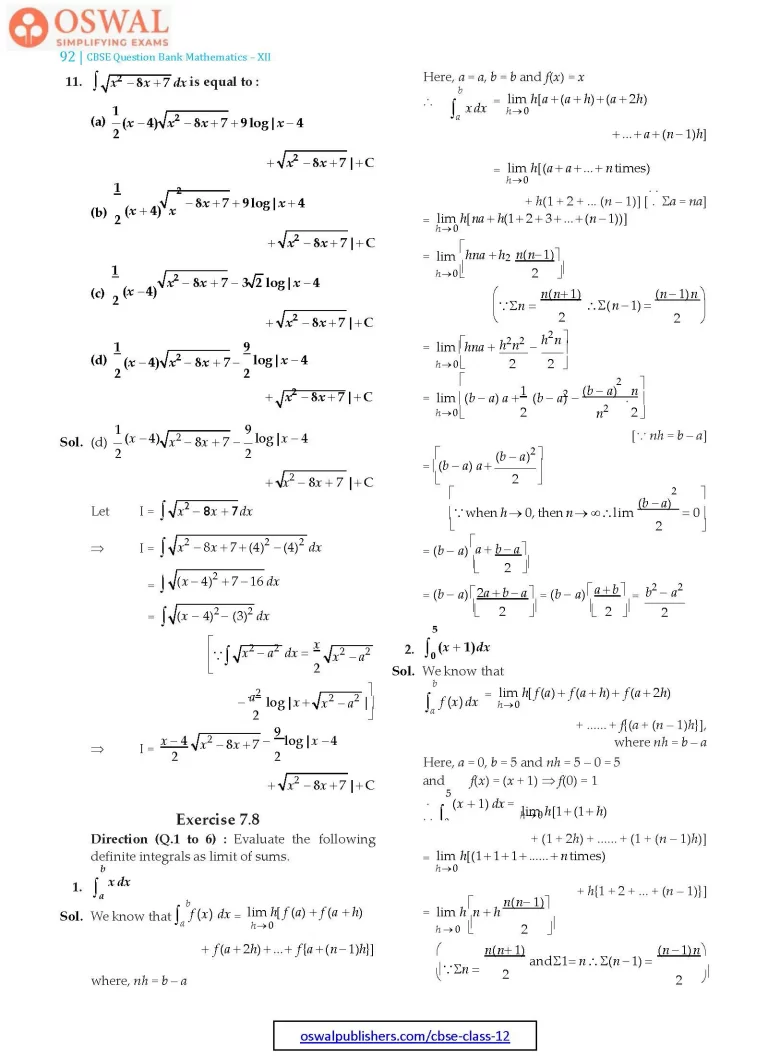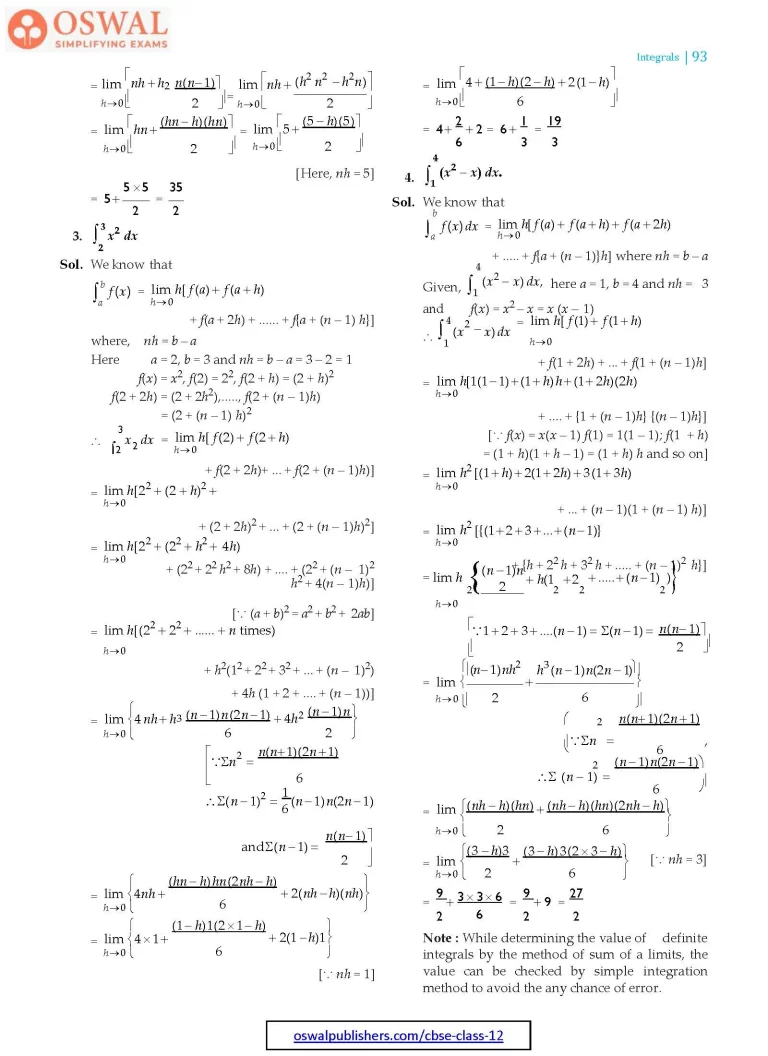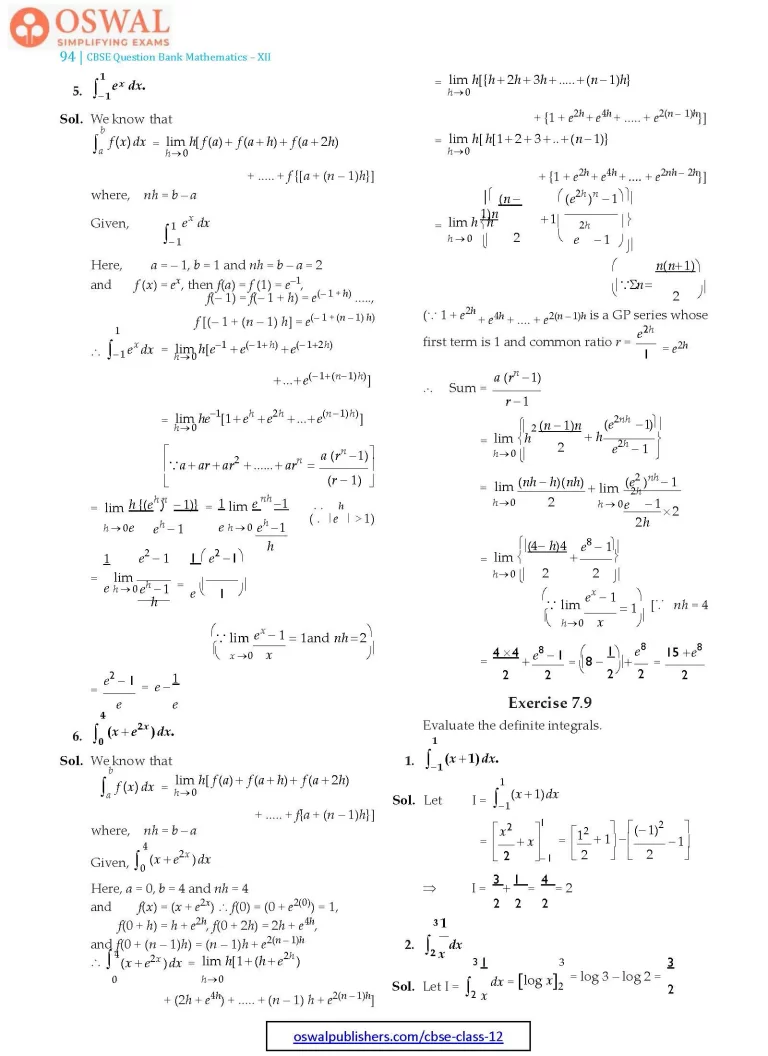NCERT Solutions for Class 12 Maths Chapter 7 - Integrals - Exercise 7.8



Exercise 7.1 Solutions 22 Questions
Exercise 7.2 Solutions 39 Questions
Exercise 7.3 Solutions 24 Questions
Exercise 7.4 Solutions 25 Questions
Exercise 7.5 Solutions 23 Questions
Exercise 7.6 Solutions 24 Questions
Exercise 7.7 Solutions 11 Questions
Exercise 7.8 Solutions 6 Questions
Exercise 7.9 Solutions 22 Questions
Exercise 7.10 Solutions 10 Questions
Exercise 7.11 Solutions 21 Questions
Miscellaneous Exercise on Chapter 7 Solutions 44 Questions
Exercise 7.8
Direction (Q.1 to 6) : Evaluate the following definite integrals as limit of sums.
$$\textbf{1.\space}\int^{b}_{a}\space\textbf{x dx}\\\textbf{Sol.\space}\text{We know that}\\\space\int^{b}_{a}\text{f(x)dx}=\lim_{h\to0}h[f(a) + f(a+h)+\\f(a+2h)+...+ f\lbrace a+(n-1)h\rbrace]$$
where, nh = b – a
Here, a = a, b = b and f(x) = x
$$\therefore\space \int^{b}_{a}\space\text{x dx}=\lim_{h\to0}h[a + (a+h)+(a+2h)+...\\+a+(n-1)h]\\=\lim_{h\to 0}h[(a+a+...+ n\space \text{times})+\\h(1+2+...(n-1))]\\\lbrack\because\space\Sigma a=ma\rbrack\\=\lim_{h\to0} h[na+h(1+2+3+...+(n-1))]\\=\lim_{h\to0}\bigg[hna+h^2\frac{n(n-1)}{2}\bigg]\\\bigg(\because\space\Sigma n=\frac{n(n+1)}{2}\therefore\space \Sigma(n-1)=\frac{(n-1)n}{2}\bigg)\\$$
$$=\lim_{h\to0}\bigg[hna + \frac{h^2n^2}{2}-\frac{h^2n}{2}\bigg]\\=\lim_{h\to0}\bigg[(b-a) a +\frac{1}{2}(b-a)^2-\frac{(b-a)^2}{n^2}.\frac{n}{2}\bigg]\\\lbrack\because\space nh=b-a\rbrack\\=\bigg[(b-a)a+\frac{(b-a)^2}{2}\bigg]\\\begin{bmatrix}\because\space\text{when}\space h\to0, \text{then n}\to \infty\space\\\therefore\text{lim}\space\frac{(b-a)^2}{2}=0\end{bmatrix}\\=(b-a)\bigg[a +\frac{b-a}{2}\bigg]\\=(b-a)\bigg[\frac{2a+b-a}{2}\bigg]$$
$$=(b-a)\bigg[\frac{a+b}{2}\bigg]\\=\frac{b^2-a^2}{2}$$
$$\textbf{2.}\space\int^{\textbf{5}}_{\textbf{0}}\space\textbf{(x+1)}\textbf{dx}\\\textbf{Sol.}\space\text{we know that}\\\int^{b}_{a}\space\text{f(x)}dx=\lim_{h\to0}\space h[f(a)+f(a+h)+\\f(a+2h)+......+f\lbrace(a+(n-1))h\rbrace],$$
where nh = b – a
Here, a = 0, b = 5 and nh = 5 – 0 = 5 and
f(x) = (x + 1)
$$\Rarr\space f(0)=1\\\therefore\space\int^{5}_{0}\space(x+1)dx=\lim_{h\to0}h[1+(1+h)+\\(1+2h)+.....+(1+(n-1))h]\\=\lim_{h\to0}\space h\bigg[n+h\frac{n(n-1)}{2}\bigg]\\\begin{pmatrix}\because\Sigma n=\frac{n(n+1)}{2}\text{and}\space\Sigma1=n\\\therefore\space\Sigma(n-1)=\frac{(n-1)n}{2}\end{pmatrix}$$
$$=\lim_{h\to0}\space\bigg[nh+h^2\frac{n(n-1)}{2}\bigg]\\=\lim_{h\to0}\bigg[nh+\frac{(h^2n^2-h^2n)}{2}\bigg]\\=\lim_{h\to0}\bigg[hn+\frac{(hn-h)(hn)}{2}\bigg]\\=\lim_{h\to0}\bigg[5+\frac{(5-h)(5)}{2}\bigg]\\\lbrack\text{Here, nh=5}\rbrack\\=5+\frac{5×5}{2}=\frac{35}{2}$$
$$\textbf{3.\space}\int^{\textbf{3}}_{\textbf{2}}\space \textbf{x}^\textbf{2}\space \textbf{dx}$$
Sol. We know that
$$\int^{b}_{a}\space f(x)=\lim_{h\to0}h[f(a)+f(a+h)+\\f(a+2h)+......+f\lbrace a + (n-1)h\rbrace]$$
where, nh = b – a
Here a = 2, b = 3 and nh = b – a = 3 – 2 = 1
f(x) = x2, f(2) = 22, f(2 + h) = (2 + h)2 f(2 + 2h) = (2 + 2h2),....., f(2 + (n – 1)h)
= (2 + (n – 1) h)2
$$\therefore\space\int^{3}_{2}x^2\space dx=\lim_{h\to0} h[f(2)+f(2+h)+\\f(2+2h)+...+f(2+(n-1)h)]\\=\lim_{x\to0}\space h[2^2+(2+h)^2+(2+2h)^2+...+\\(2+(n-1)h)^2]\\=\lim_{h\to0}\space h[2^2+(2^2+h^2+4h)+(2^2+2^2h^2+8h)\\+....+(2^2+(n-1)^2)h^2+4(n-1)h]\\\lbrack\because (a+b)^2=a^2+b^2+2ab\rbrack\\=\lim_{h\to0}\space h[2^2+ 2^2+......+ n\space\text{times}]+\\h^2(1^2+2^2+3^2+...+(n-1)^2)+\\4h(1+2+....+(n-1))]$$
$$=\lim_{h\to0}\begin{Bmatrix}4nh + h^3\frac{(n-1)n(2n-1)}{6}+4h^2\frac{(n-1)n}{2}\end{Bmatrix}\\\begin{bmatrix}\because\space\Sigma n^2=\frac{n(n+1)(2n+1)}{6}\\\therefore\space\Sigma(n-1)^2=\frac{1}{6}(n-1)n(2n-1)\space\\\text{and}\space\Sigma(n-1)=\frac{n(n-1)}{2}\end{bmatrix}$$
$$=\lim_{h\to0}\begin{Bmatrix}4\pi h+\frac{(hn-h)hn(2nh-h)}{6}+\\2(nh-h)(nh)\end{Bmatrix}\\=\lim_{h\to0}\begin{Bmatrix}4×1+\frac{(1-h)1(2×1-h)}{6}+2(1-h)1\end{Bmatrix}\\\lbrack\because\space nh=1\rbrack\\=\lim_{h\to0}\bigg[4+\frac{(1-h)(2-h)}{6}+2(1-h)\bigg]\\=4+\frac{2}{6}+2=6+\frac{1}{3}=\frac{19}{3}$$
$$\textbf{4.\space}\int^{\textbf{4}}_{\textbf{1}}\space\textbf{(x}^\textbf{2}\textbf{-x)dx.}$$
Sol. We know that
$$\int^{b}_{a}\space\text{f(x)dx}=\lim_{h\to0}\space h[f(a)+f(a+h)+\\f(a+2h)+.....+f\lbrace a+(n-1)\rbrace h]$$
where nh = b – a
$$\text{Given,\space}\int^{4}_{1}(x^2-x)dx,\space$$
here a = 1, b = 4 and nh = 3
and f(x) = x2 – x = x (x – 1)
$$\therefore\space\int^{4}_{1}(x^2-x)dx=\lim_{h\to0}h[f(1)+f(1+h)+\\f(1+2h)+...+f(1+(n-1)h)]\\=\lim_{h\to0}\space h[1(1-1)+(1+h)h+(1+2h)(2h)\\+.....+\lbrace1+(n-1)h\rbrace \lbrace(n-1)h\rbrace]\\\lbrack\because\space f(x)=x(x-1)f(1)=1(1-1);f(1+h)\rbrack\\=(1+h)(1+h-1)=(1+h)h\space\text{and so on}\rbrack$$
$$=\lim_{h\to0}\space h^2[(1+h)+2(1+2h)+3(1+3h)\\+...+(n-1)(1+(n-1))h]\\=\lim_{h\to0}\space h^2[\lbrace(1+2+3+.. +(n-1))\rbrace +\\\lbrace h+2^2h+3^2h +......+ (n-1)^2h\rbrace]\\=\lim_{h\to0}\space h^2\begin{Bmatrix}\frac{(n-1)n}{2}+h(1^2+2^2+......+(n-1)^2)\end{Bmatrix}\\\begin{bmatrix}\because\space 1+2+3+.....(n-1)\\=\Sigma(n-1)=\frac{n(n-1)}{2}\end{bmatrix}$$
$$=\lim_{h\to0}\begin{Bmatrix}\frac{(n-1)nh^2}{2}+\frac{h^3(n-1)n(2n-1)}{6}\end{Bmatrix}\\\begin{pmatrix}\because\space \Sigma n^2=\frac{n(n+1)(2n+1)}{6},\\\therefore\space \Sigma(n-1)^2=\frac{(n-1)n(2n-1)}{6}\end{pmatrix}\\=\lim_{h\to0}\begin{Bmatrix}\frac{(nh-h)(hn)}{2}+\frac{(nh-h)(hn)(2nh-h)}{6}\end{Bmatrix}\\=\lim_{h\to0}\begin{Bmatrix}\frac{(3-h)3}{2}+\frac{(3-h)3(2×3-h)}{6}\end{Bmatrix}\\\lbrack\because\space nh=3\rbrack\\=\frac{9}{2}+\frac{3×3×6}{6}\\=\frac{9}{2}+9=\frac{27}{2}$$
Note : While determining the value of definite integrals by the method of sum of a limits, the value can be checked by simple integration method to avoid the any chance of error.
$$\textbf{5.}\space\int^{\textbf{1}}_{\normalsize\textbf{-1}}\space \textbf{e}^\textbf{x} \textbf{dx}.$$
Sol. We know that
$$\int^{b}_{a}\space f(x)dx=\lim_{h\to0}\space h[f(a)+f(a+h)+\\f(a+2h)+.....+f\lbrace a+(n-1)h\rbrace]$$
where, nh = b – a
$$\text{Given,}\space \int^{1}_{\normalsize-1}\space e^x\space dx$$
Here, a = – 1, b = 1 and nh = b – a = 2
and f (x) = ex, then f(a) = f (1) = e–1,
f(– 1) = f(– 1 + h) = e(– 1 + h) .....,
f [(– 1 + (n – 1) h] = e(– 1 + (n – 1) h)
$$\therefore\space\int^{1}_{\normalsize-1}\space e^xdx=\lim_{h\to0} h[e^{\normalsize-1}+e^{(-1+h)}+\\e^{(\normalsize-1+2h)}+...+e^{(-1+(n-1)k)}]$$
$$=\lim_{h\to0}\space he^{\normalsize-1}[1+e^k+e^{2h}+...+e^{((n-1)h)}]$$
$$\begin{bmatrix}\because\space a+ar+ar^2+......+ar^n\\=\frac{a(r^n-1)}{(r-1)}\end{bmatrix}\\=\lim_{h\to0}\space\frac{h}{e}\frac{\lbrace((e^h)^n-1)\rbrace}{e^h-1}\\=\frac{1}{e}\lim_{x\to0}\frac{e^{nh}-1}{\frac{e^h-1}{h}}\\=\frac{1}{e}\bigg(\frac{e^2-1}{1}\bigg)\\\bigg(\because\space\lim_{x\to0}\frac{e^x-1}{x}=1\space\text{and nh=2}\bigg)\\=\frac{e^2-1}{e}= e-\frac{1}{e}$$
$$\textbf{6.\space}\int^{\textbf{4}}_{\textbf{0}}\textbf{(x+e}^{\textbf{2x}})\textbf{dx.}$$
Sol. We know that
$$\int^{b}_{a}\space\text{f(x)}dx=\lim_{h\to0}h[f(a)+f(a+h)\\+f(a+2h)+......+f\lbrace a+(n-1)h\rbrace]$$
where, nh = b – a
$$\text{Given,}\int^{4}_{0}(x+e^{2x})dx$$
Here, a = 0, b = 4 and nh = 4
and f(x) = (x + e2x)
∴ f(0) = (0 + e2(0)) = 1,
f(0 + h) = h + e2h, f(0 + 2h) = 2h + e4h,
and f(0 + (n – 1)h) = (n – 1)h + e2(n – 1)h
$$\therefore\space\int^{4}_{0}(x+e^{2x})dx=\lim_{h\to0}\space h[1+(h+e^{2h}) + \\(2h+e^{4k})+......+(n-1)\space h + e^{2(n-1)h}]\\=\lim_{h\to0}\space h[(h+2h+3h+.....+(n-1))h+\\\lbrace 1+ e^{2h}+e^{4h}+.....+e^{2(n-1)h}\rbrace]\\=\lim_{h\to0}\space h[h\lbrace 1+2+3+..+(n-1)\rbrace+\\\lbrace1+ e^{2k} + e^{4k} + .....+e^{2nh-2h}\rbrace]\\=\lim_{h\to0}\space h\begin{Bmatrix}h\frac{(n-1)n}{2}+1\bigg(\frac{(e^{2h})^n-1}{e^{2h}-1}\bigg)\end{Bmatrix}\\\bigg(\because\space\Sigma n=\frac{n(n+1)}{2}\bigg)$$
$$\because\space 1+ e^{2k}+e^{4k}+....+e^{2(n-1)h}\\\text{is a GP series whose first term is 1}\\\text{and common ratio r =}\frac{e^{2h}}{1}=e^{2h}$$
$$\therefore\space\text{Sum}=\frac{a(r^n-1)}{r-1}$$
$$=\lim_{h\to0}\begin{Bmatrix}h^2\frac{(n-1)n}{2}+h\frac{(e^{2nh}-1)}{e^{2h}-1}\end{Bmatrix}\\=\lim_{h\to0}\space\frac{(nh-h)(nh)}{2}+\lim_{h\to0}\frac{(e^2)^{nh}-1}{\frac{e^{2h-1}}{2h}×2}\\=\lim_{h\to0}\begin{Bmatrix}\frac{(4-h)4}{2}+\frac{e^8-1}{2}\end{Bmatrix}\\\bigg(\because\space\lim_{h\to0}\frac{e^x-1}{x}=1\bigg)\\\lbrack\because\space nh=4\rbrack\\=\frac{4×4}{2}+\frac{e^8-1}{2}\\=\bigg(8-\frac{1}{2}\bigg)+\frac{e^8}{2}=\frac{15+e^8}{2}$$
Share page on
NCERT Solutions Class 12 Mathematics
- Chapter 1 Relations and Functions
- Chapter 2 Inverse Trigonometric Functions
- Chapter 3 Matrices
- Chapter 4 Determinants
- Chapter 5 Continuity and Differentiability
- Chapter 6 Application of Derivatives
- Chapter 7 Integrals
- Chapter 8 Applications of the Integrals
- Chapter 9 Differential Equations
- Chapter 10 Vectors
- Chapter 11 Three-Dimensional Geometry
- Chapter 12 Linear Programming
- Chapter 13 Probability
CBSE CLASS 12 NCERT SOLUTIONS
- NCERT Solutions Class 12 English Core
- NCERT Solutions Class 12 Physics
- NCERT Solutions Class 12 Chemistry
- NCERT Solutions Class 12 Biology
- NCERT Solutions Class 12 Business Studies
- NCERT Solutions Class 12 Mathematics
- NCERT Solutions Class 12 Accountancy
- NCERT Solutions Class 12 Economics
- NCERT Solutions Class 12 Geography
- NCERT Solutions Class 12 History
- NCERT Solutions Class 12 Political Science
CBSE CLASS 12 SYLLABUS
- CBSE Class 12 English core Syllabus
- CBSE Class 12 Mathematics Syllabus
- CBSE Class 12 Physics Syllabus
- CBSE Class 12 Chemistry Syllabus
- CBSE Class 12 Biology Syllabus
- CBSE Class 12 Accountancy Syllabus
- CBSE Class 12 Business Studies Syllabus
- CBSE Class 12 Economics Syllabus
- CBSE Class 12 History Syllabus
- CBSE Class 12 Geography Syllabus
- CBSE Class 12 Political science Syllabus
- CBSE Class 12 Sociology Syllabus
- CBSE Class 12 Psychology Syllabus
- CBSE Class 12 Physical education Syllabus
- CBSE Class 12 Applied mathematics Syllabus
- CBSE Class 12 History of Indian Arts Syllabus
CBSE CLASS 12 Notes
- CBSE Class 12 Physics Notes
- CBSE Class 12 Chemistry Notes
- CBSE Class 12 Biology Notes
- CBSE Class 12 Maths Notes
- CBSE Class 12 Accountancy Notes
- CBSE Class 12 Business Studies Notes
- CBSE Class 12 Economics Notes
- CBSE Class 12 History Notes
- CBSE Class 12 Geography Notes
- CBSE Class 12 Political Science Notes

